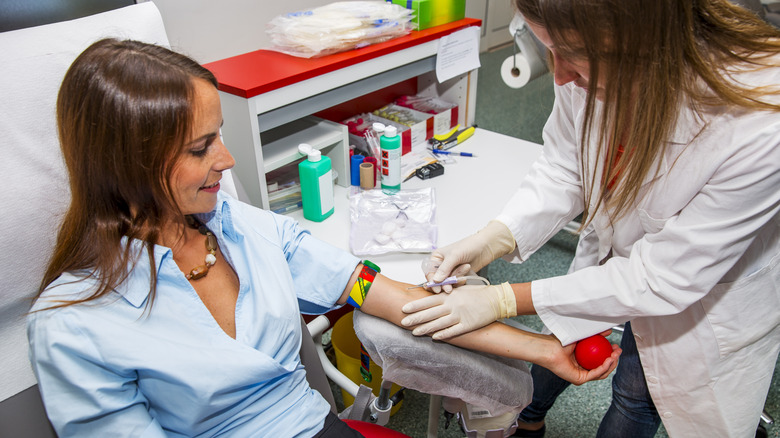Blood Types That Increase Your Risk Of A Heart Attack
If you don't already know your blood type, you may want to. Knowing which type you are can be important since blood type can influence some health factors, including your risk of having a heart attack.
The connection between blood type and health risk factors is widely accepted in the medical profession and preventative health communities. Per an article in the Cardiovascular Journal of Africa, a 2017 study found that people with non-O blood types had a higher likelihood of experiencing cardiovascular events, including stroke, heart failure, and heart attack. "We demonstrate that having a non-O blood group is associated with a 9% increased risk of coronary events and a 9% increased risk of cardiovascular events, especially myocardial infarction," according to study lead Tessa Kole.
This may be meaningful data if you're blood type A, B, or AB. Serious blood clot development is more prominent in individuals with those blood types (although the AB blood type hasn't been as well studied), per the American Heart Association (AHA). Blood clots can lead to serious heart conditions and even fatalities. To learn more, Health Digest interviewed Dr. Alexandra Kharazi about what an individual with blood type A, B, or AB should know about their heart attack risk.
Important but not a guarantee
Dr. Kharazi confirms that a non-O blood type can influence blood clotting and inflammation. "These blood types are linked to higher levels of a clotting protein called von Willebrand factor, which can potentially increase the risk of blockages in heart arteries," she explains.
Though it's essential for your body to be able to clot blood, too much clotting is a problem. According to the AHA, when the blood begins to form too many clots, those clots can make it challenging for blood to move through the body. And if a blood clot becomes loose, it can move through the blood stream and set a heart attack in motion.
With that said, you aren't guaranteed a heart attack if you're blood type A, B, or AB. As Dr. Kharazi notes, regardless of your blood type, you can mitigate your chances of developing cardiovascular disease by focusing on heart-healthy habits. "Lifestyle makes the biggest difference, no matter your blood type."
Preserving heart health through behavioral changes
Depending upon your lifestyle, you may already be reducing your risk of heart attack. For instance, eating a balanced diet that's heavy in fruits, vegetables, and lean protein is one method Dr. Kharazi recommends for protecting your cardiovascular system.
Additionally, even a small increase in your physical activity can have a big influence on the state of your cardiovascular system. In a 2019 review in Oxidative Medicine and Cellular Longevity, authors determined that 40 minutes of moderate to intense aerobic physical activity three or four times weekly could make a difference in heart attack risk. They added that any exercise is better than no exercise, and that exercise should be personalized to ensure its continuation.
Finally, avoid smoking or make a plan to quit. According to the U.S. Centers for Disease Control and Prevention, smoking plays a part in about 25% of all cardiovascular disease events. It also raises the chances of having a heart attack up to four times greater than they would be for a non-smoker.
Your blood type is just one consideration when it comes to your cardiovascular health. It may be frustrating to know that you might be more at risk for a heart attack than someone else, but you still have plenty of other factors you can control to keep your heart going strong.



